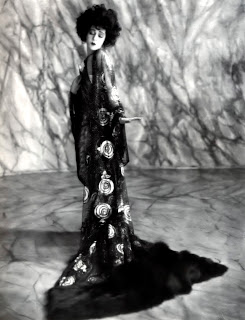there once was
a little girl
with violet eyes and a violin
who grew up to be
a celluloid Scheherazade
telling a thousand tales
of queens and fallen women
Camille
Salome
she was a peacock
a d-minor chord
a crushed velvet shawl
she was chypre
incense as dark and thick
as her hair
madame
you were the most important flower
in the garden
even when it dwindled to one
solitary
blossom
a child of the streets
who still lingers there
like the fading strains of your violin
Alla Nazimova
Monday, January 31, 2011
Thursday, January 27, 2011
Oy, this winter!
Those of you in the same boat - be safe and stay warm!
Tuesday, January 11, 2011
Intolerance (1916)
Happy New Year everyone! It's time we get back in the swing of things, and what better to start with than one of Griffith's epics?
First, a disclaimer: I've never seen Birth of a Nation. Now I know what you're thinking: "Jen, how can you call yourself a film buff - a silent film buff - and still not have this one under your belt?" My reply would be "My good reader, I don't wear belts."
*ba-dum ching*
This was my introduction to the world of Griffith, and I enjoyed it for the most part; the main drawback for me was the film's length. I found myself on the edge of my seat for the Babylonian and Modern Day sequences, but when the French Renaissance sections came on I was - to be blunt - bored out of my skull. I realize how each part was necessary to tell his story in whole, but I can't help but feel Griffith could've left out the French part entirely and still have had a wonderful film. Having said that, Intolerance is beautifully shot, with an ageless story to tell, punctuated by Lillian Gish's endless rocking.
I also discovered the revelation that is Mae Marsh. I have rarely seen - especially in a picture this early on - someone with such natural skill. She becomes the Dear One: innocently effervescent, then heartrendingly sad; a quiet, gentle soul who becomes the fires of Hell itself when her child is threatened. Her scenes with Bobby Harron are so frank and intimate you almost forget it's a movie.
Constance Talmadge is the Mountain Girl, and I don't think I've cheered that hard for someone in a long time. Her tough and spunky portrayal rescues the Babylonian story from being a one-dimensional condemnation of decadence.
Definitely see this one - it is considered a masterpiece, and for good reason. Now if you'll excuse me, I'm off to buy a belt.
I give this one: 









Friday, January 7, 2011
Subscribe to:
Posts (Atom)









